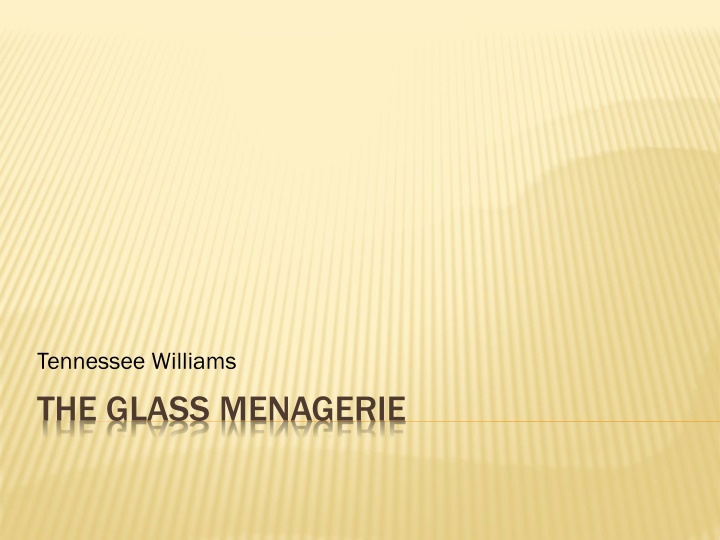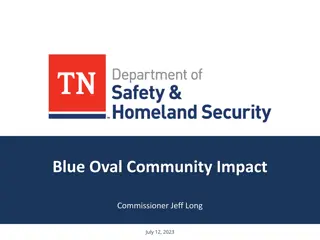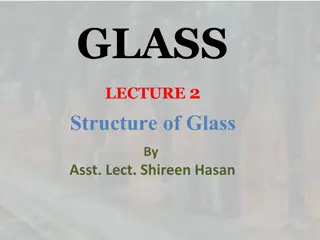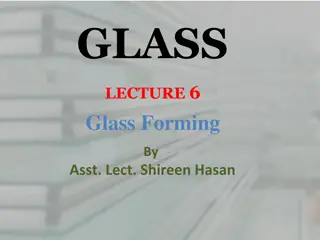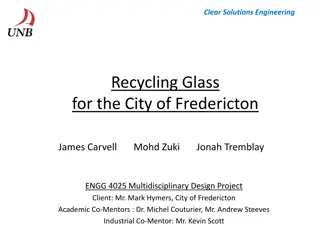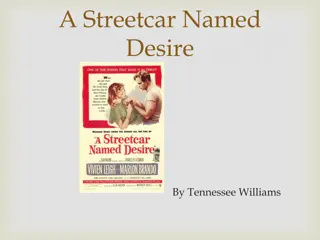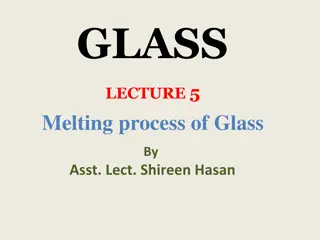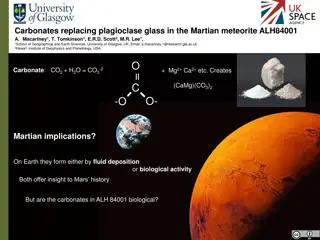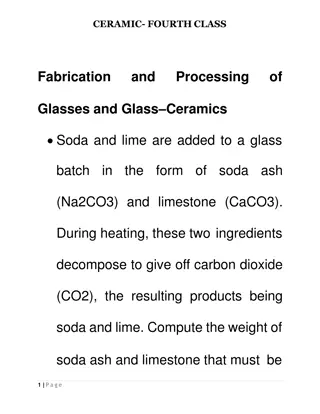The Glass Menagerie by Tennessee Williams
In "The Glass Menagerie," the characters navigate family dynamics and personal aspirations. Tom struggles with his mother Amanda's controlling nature, while Laura tries to find her place in the world. As tensions rise over dinner, the family dynamics unfold, revealing underlying emotions and desires. A story intricately woven with themes of individuality, family bonds, and societal expectations, "The Glass Menagerie" captures the complexities of human relationships.
Download Presentation

Please find below an Image/Link to download the presentation.
The content on the website is provided AS IS for your information and personal use only. It may not be sold, licensed, or shared on other websites without obtaining consent from the author.If you encounter any issues during the download, it is possible that the publisher has removed the file from their server.
You are allowed to download the files provided on this website for personal or commercial use, subject to the condition that they are used lawfully. All files are the property of their respective owners.
The content on the website is provided AS IS for your information and personal use only. It may not be sold, licensed, or shared on other websites without obtaining consent from the author.
E N D
Presentation Transcript
Tennessee Williams THE GLASS MENAGERIE
Animals have sections in their stomachs which enable them to digest food without mastication, but human beings are supposed to chew their food before they swallow it down. Eat food leisurely, son, and really enjoy it. A well-cooked meal has lots of delicate flavours that have to be held in the mouth for appreciation. So chew your food and give your salivary glands a chance to function !
[TOM deliberately lays his imaginary fork down and his chair back from the table.] TOM: I haven't enjoyed one bite of this dinner because of your constant directions on how to eat it. It's you that makes me rush through meals with your hawk-like attention to every bite I take. Sickening - spoils my appetite - all this discussion of - animals' secretion - salivary glands -mastication !
AMANDA [lightly]: Temperament like a Metropolitan star ! [He rises and crosses downstage.] You're not excused from the table. TOM: I'm getting a cigarette. AMANDA: You smoke too much. [LAURA rises.]
LAURA: I'll bring in the blancmang. [He remains standing with his cigarette by the porti res during the following.] AMANDA [rising]: No, sister, no, sister - you be the lady this time and I'll be the darkey LAURA: I'm already up.
AMANDA: Resume your seat, little sister, I want you to stay fresh and pretty for gentleman callers! LAURA: I'm not expecting any gentleman callers. AMANDA [crossing out to kitchenette. Airily]: Sometimes they come when they are least expected! Why, I remember one Sunday afternoon in Blue Mountain -[Enters kitchenette.]
TOM: I know what's coming LAURA: Yes. But let her tell it. TOM: Again? LAURA: She loves to tell it. [AMANDA returns with bowl of dessert.]
AMANDA: One Sunday afternoon in Blue Mountain, your mother received seventeen! gentlemen callers! Why, sometimes there weren't chairs enough to accommodate them all. We had to send the nigger over to bring in folding chairs from the parish house. TOM [remaining at porti res]: How did you entertain those gentleman callers?
A M A N D A: I understood the art of conversation ! TOM: I bet you could talk. AMANDA: Girls in those days knew how to talk, I can tell you. TOM: Yes? [IMAGE: AMANDA AS A GIRL ON A PORCH GREETING CALLERS.]
AMANDA: They knew how to entertain their gentlemen callers. It wasn't enough for a girl to be possessed of a pretty face and a graceful figure although I wasn't alighted in either respect. She also needed to have a nimble wit and a tongue to meet all occasions.
TOM: What did you talk about? AMANDA: Things of importance going on in the world ! Never anything coarse or common or vulgar. [She addresses Tom as though he were seated in the vacant chair at the table though he remains by portieres. He plays this scene as though he held the book.]
My callers were gentleman -all! Among my callers were some of the most prominent young planters of the Mississippi Delta - planters and sons of planters! [Tom motions for music and a spot of light on AMANDA. Her eyes lift, her face glows, her voice becomes rich and elegiac. SCREEN LEGEND: 'O SONT Les NEIGES']
There was young Champ Laughlin who later became vice-president of the Delta Planters Bank. Hadley Stevenson who was drowned in Moon Lake and left his widow one hundred and fifty thousand in Government bonds.
There were the Cutrere brothers, Wesley and Bates. Bates was one of my bright particular beaux! He got in a quarrel with that wild Wainwright boy. They shot it out on the floor of Moon Lake Casino. Bates was shot through the stomach. Died in the ambulance on his way to Memphis.
His widow was also well provided for, came into eight or ten thousand acres, that's all. She married him on the rebound - never loved her - carried my picture on him the night he died !And there was that boy that every girl in the Delta had set her cap for! That brilliant, brilliant young Fitzhugh boy from Greene County!
TOM: What did he leave his widow? AMANDA: He never married ! Gracious, you talk as though all of my old admirers had turned up their toes to the daisies ! TOM: Isn't this the first you've mentioned that still survives ?
AMANDA: That Fitzhugh boy went North and made a fortune - came to be known as the Wolf of Wall Street! He had the Midas touch, whatever he touched turned to gold! And I could have been Mrs Duncan J. Fitzhugh, mind you! But - I picked your father !
LAURA [rising]: Mother, let me clear the table. AMANDA: No, dear, you go in front and study your typewriter chart. Or practise your shorthand a little. Stay fresh and pretty! It's almost time for our gentlemen callers to start arriving. [She flounces girlishly toward the kitchenette.] How many do you suppose we're going to entertain this afternoon?
[Tom throws down the paper and jumps up with a groan.] LAURA [alone in the dining-room]: I don't believe we're going to receive any, Mother. AMANDA [reappearing, airily ] What? Not one - not one? You must be joking!
[LAURA nervously echoes her laugh.S he slips in a fugitive manner through the half-open porti res and draws them in gently behind her. A shaft of very clear light is thrown on her face against the faded tapestry of the curtains.] [MUSIC: 'THE GLASS MENAGERIE' UNDER FAINTLY. Lightly.]
Not one gentleman caller? It can't be true ! There must be a flood, there must have been a tornado! LAURA: It isn't a flood, it's not a tornado, Mother. I'm just not popular like you were in Blue Mountain. ... [Tom utters another groan. LAURA glances at him with a faint, apologetic smile. Her voice catching a little.] Mother's afraid I'm going to be an old maid.
THE SCENE DIMS OUT WITH 'GLASS MENAGERIE' Music 'Laura Haven't you Ever Liked Some Boy?' On the dark stage the screen is lighted with the image of blue roses.
[Gradually LAURA' S figure becomes apparent and the screen goes out. The music subsides. LAURA is seated in the delicate ivory chair at the small claw-foot table. She wears a dress of soft violet material for a kimono - her hair tied back from her forehead with a ribbon.
She is washing and polishing her collection of glass. AMANDA appears on the fire-escape steps. At the sound of her ascent, LAURA catches her breath, thrusts the bowl of ornaments away and seats herself stiffly before the diagram of the typewriter keyboard as though it held her spellbound.
Something has happened to AMANDA. It is written in her face as she climbs to the landing: a look that is grim and hopeless and a little absurd. She has on one of those cheap or imitation velvety-looking cloth coats with imitation fur collar. Her hat is five or six years old, one of those dreadful cloche hats that were worn in the late twenties
and she is holding an enormous black patent- leather pocketbook with nickel clasps and initials. This is her full-dress outfit, the one she usually wears to the D.A.R. Before entering she looks through the door. She purses her lips, opens her eyes very wide, rolls them upward, and shakes her head.
